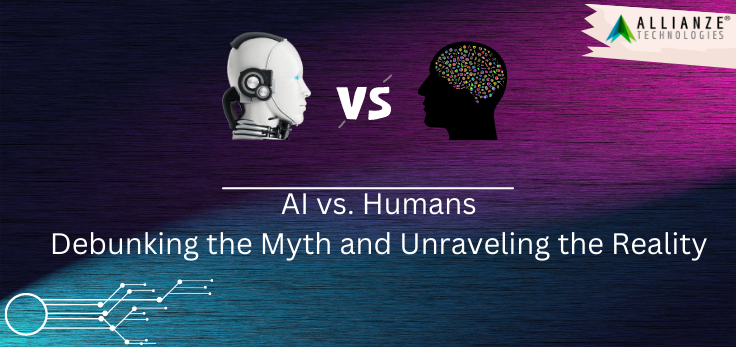We live in an era where technological innovations are restructuring the very substance of our lives. The conflict between Artificial Intelligence (AI) and human capabilities has stimulated debates and influenced the imagination of both enthusiasts and rationalists. There are numerous movies and speculative articles that have fueled the idea of a futuristic showdown between machines and humans. However, delving into the actual dynamics of this relationship unveils a far more nuanced reality. In this blog, we will dismantle the misconceptions surrounding AI, and dissect its true potential. It also highlights the symbiotic partnership that is gradually emerging between AI and human intelligence.

Understanding the Myth of Supremacy
One of the existing myths is the concept of AI's upcoming dominance over the human intellect. This notion has emerged from the concern that machines will gradually outperform humans across intellectual tasks. While AI has indeed exhibited notable accomplishments in certain domains, it is essential to realize that these feats are often narrow in scope. AI's expertise is a result of intricate algorithms designed to excel in predetermined tasks. But it lacks the extensive understanding, empathy, and creativity that define human intelligence.
The Reality of Augmentation
The actual potential of AI lies in augmentation rather than replacement. The symbiotic relationship between AI and human intelligence is already shaping various industries. As a result, AI assists medical professionals in diagnosing diseases by analyzing vast datasets at unprecedented speeds. Also, in finance, AI-driven algorithms optimize investment portfolios, providing insights that humans alone might overlook. This synergy improves human capabilities, facilitating us to make more informed decisions and accelerating progress.
Navigating the Ethical Concerns
Ethical concerns have supported the notion of AI as a looming threat. However, it is essential to remember that AI systems are ultimately designed and controlled by humans. The ethical implications arise not from AI itself but from how we deploy and govern it. Bias in AI algorithms, data privacy breaches, and job displacement are challenges that need proactive human intervention. Thus, the discourse should shift from fearing AI to responsibly managing its development and application.
From Automation to Creativity
Automation, often considered the realm of AI, has undoubtedly transformed industries by simplifying recurring tasks. However, the human touch remains inevitable in domains necessitating creativity, emotional intelligence, and nuanced decision-making. Writing a poignant poem, composing a soul-stirring melody, or devising an innovative marketing campaign are all aspects of human creativity that surpass AI's capabilities. The future of work lies not in competition but in synergy, where humans and AI collaborate to attain unprecedented heights.
The Journey Towards General AI
The concept of General AI, often depicted in science fiction, entails machines possessing human-like reasoning across a broad spectrum of tasks. While this is an exciting prospect, it remains distant. Developing General AI requires grappling with the intricacies of human cognition, understanding context, and navigating the labyrinth of emotions—a feat that poses significant challenges. As of now, AI operates in a realm distinct from human consciousness, emphasizing complementarity rather than competition between the two.
Fostering Responsible Innovation
To completely leverage the potential of AI, a responsible and ethical approach to its development is imperative. The collaboration between tech experts, policymakers, ethicists, and the wider society is crucial. Transparency in AI algorithms, robust data privacy measures, and mechanisms to address bias are steps toward building trust in AI systems. By involving diverse perspectives, we can shape AI into a tool that empowers humanity rather than diminishes it.
In the realm of AI, the battle between machines and humans is a myth propagated by sensationalism and lack of understanding. The reality is far more intriguing, a landscape where AI augments human capabilities, amplifying our potential to create, innovate, and explore.
While AI possesses the capability to automate specific tasks and job functions, it's important to acknowledge that its role may lead to the displacement of humans in certain domains. AI is most proficient at managing repetitive, data-centric responsibilities and arriving at data-based conclusions. Nonetheless, human qualities such as inventiveness, discerning analysis, emotional acumen, and intricate issue resolution remain invaluable and less prone to replication by AI systems.
The trajectory of AI's evolution is more inclined toward fostering cooperation between humans and machines. But AI supplements human proficiencies and empowers individuals to dedicate their efforts to elevated responsibilities demanding human imagination and expertise. It's imperative to consider AI as a tool capable of elevating efficiency. Also, introduces novel prospects rather than as a complete surrogate for human engagement.
As we journey forward, it's not about AI versus humans but rather a harmonious collaboration that brings out the best in both. At Allianze Technologies, we recognize the transformative power of AI and the importance of leveraging it for the betterment of society. Join us in embracing this collaborative future, where humans and AI coexist to build a world of endless possibilities. Connect with us at [email protected].

